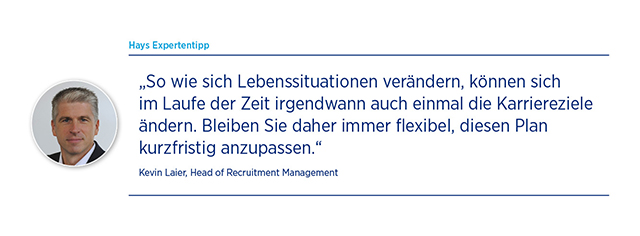STRATEGIC CAREER DEVELOPMENT
HOW TO PLAN YOUR CAREER
Not many of us have a clear vision of what we want from our career at a very young age. But at some point, we have to stop and realise that our career development will be a matter of luck if professional goals are not planned and pursued. Begin to plan your career today with the steps explained below.

It is important that you act in the most structured way possible to ensure that you do not overlook important aspects. Therefore, divide your planning into three big steps.
Analysis: Where do you stand in your career?
The basis for each strategy is an analysis of the current situation. The same applies when planning your career.
1. Reflect on yourself
Spend some time considering your skills, interests and personality. Use the knowledge to ensure that the career plan you create is right for you. Here are some pointers to get you started:
- What do you like about your position, your profession and your industry?
- Are there things about your job that you don't like?
- What are your most outstanding professional skills?
- Which of your skills are transferable to other jobs?
- In which areas do you need further training?
- Which areas of your profession do you master particularly well?
- What is difficult for you?
- What are your professional achievements?
- What makes up your personality?
- Do you prefer to work in a team or alone?
- Do you have good managerial skills?
2. Know your options
Make sure that you understand the career possibilities available to you. The career plan you put together should be based on a thorough understanding of the employment market within your chosen industry or profession.
- Learn what career opportunities you have if you stay with your current employer.
- Find out how you can gain further knowledge in your current position.
- Identify the leading companies (potential employers) in your industry.
- Explore which adjacent industries would also be suitable for you to increase your chances.
- Think about alternative career opportunities.
- Consider what options you have for professional development and skills training.
- Find out which qualifications are necessary and which represent added value. Browse job boards and take a look at job offers.
- Analyse the careers of successful people in your profession.
- Think about the prospect of relocating, either within your country or to a foreign country.
- Decide on the type of employment and whether you prefer to work part-time or full-time.



Planning: Define your goals
Once you have analysed the current situation, you can proceed to the planning phase.
3. Set your goals
Now is the time to combine your self-awareness with the knowledge of your options to determine your career goals.
- Write down short, concrete goals that you can work towards. For example: "In ten years I would like to be the financial director of a large personnel consultancy". If you can't name a specific job, focus on more general goals.
- Be positive and realistic. Don't underestimate your abilities and value, but be honest with yourself. Unattainable goals can be very demotivating.
- Be aware of the fact that your goals will change. What did you want to be when you were 5 years old? Did you still have the same goals when you were 10, 20 and 30? As you evolve, your goals will also change. Work itself also changes. So don't assume that a single career plan will pull you through until retirement. Include short, medium and long-term goals in your plan and review them at least once a year.
- Divide your long-term goals into smaller, measurable successes and set yourself a timeframe in which you would like to achieve them. If you want to be the financial director of a large company in ten years' time, the first step might be to become a financial controller or finance department manager within the next five years.
- There is always a risk that external factors will interfere with your plans - so be prepared and adapt accordingly. If the job or sector you have chosen is going downhill, it makes no sense to stick to your plan at any price. In this case, adjust your timeframe or find an alternative solution. Then start your job search.
Realisation: Put your plans into action
This is the active part of your career planning. Take concrete actions.
4. Get active
Implement the actions that will help you to achieve your career goals:
- Make an appointment with your manager/HR department to discuss your development opportunities.
- Take on additional projects to expand your experience.
- Attend further training courses, if required.
- Establish business contacts inside and outside your company.
- Consult contacts in your industry.
- Find yourself a mentor.
- Assume the help of specialised personnel service providers.
- Learn to market yourself.
- Get the most out of your social media profile.
- Keep an eye on the job market and the associated changes.
- It is important that you create a meaningful CV that suits your industry/function.
- Proceed strategically and apply for the right positions. You can also send unsolicited applications if you cannot find a suitable job advertisement.
- Improve your communication and presentation skills.
And one last piece of advice: Believe in yourself! If you know exactly who you are, what opportunities you have and with a realistic career plan at hand, there is absolutely nothing to stop you from achieving your goals. So once the plan is in place, it's up to you to make it happen.

